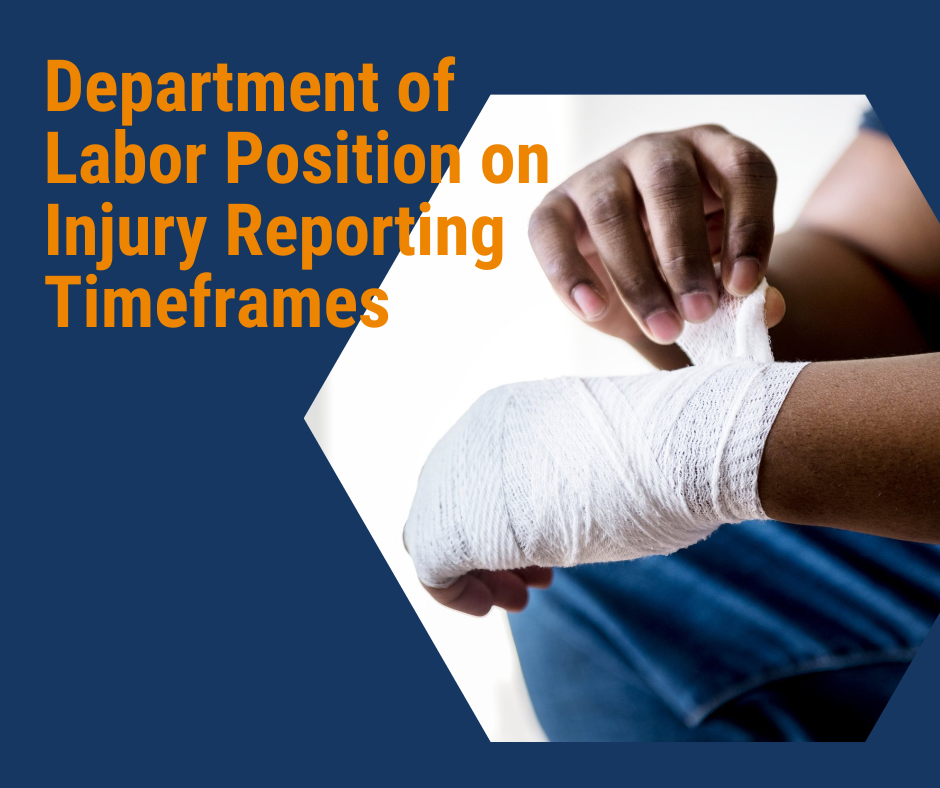
Department of Labor's Position on Injury Reporting Timeframes
By Jennifer Hurless, president, PartnerSource
What is the one thing an occupational injury program can do to increase the likelihood of a positive medical outcome? Ask any professional who cares for injured workers and regardless of whether the professional is a carrier, an employer or in the medical field, most will confidently argue that the answer is timely injury reporting and receipt of initial medical care. But, PartnerSource and a few Texas option program sponsors learned that the Department of Labor (DOL) viewed these injury reporting timeframes negatively -- at least without some adjustments to how the injury reporting timeframes should be administered under the terms of the benefit plan.
The Employee Benefits Security Administration (EBSA) division within the Department of Labor recently completed a review of several Texas injury benefit plans, including plan documents PartnerSource had drafted over the years. This fall, PartnerSource and all programs reviewed received a no action letter with guidance on how to administer the injury reporting provisions in a manner more consistent with EBSA’s interpretation of a long-standing claim regulation1. Here’s what we have learned.
Injury Reporting Timeframes
In its communication with PartnerSource, EBSA expressed concern over short injury reporting timeframes, like end of shift, 24 hours and even 3 days. EBSA stated these short timeframes "unduly inhibit a participant’s ability to file a claim. They neither allow for the circumstances where participants have little reason to believe the injury is significant, nor for circumstances in which the severity of the injury compromises the participants’ ability to give immediate notice."
EBSA emphasized the harshness and finality of a denial in relationship to a claimant’s actions in reporting the injury. In short, EBSA suggests that if the claimant acted reasonably under the circumstances or if the employer had actual knowledge of the injury, a denial of all plan benefits violates ERISA’s standards of fairness.
"Good Cause" Exception
Most PartnerSource programs include a "good cause" exception for failing to report an injury within the required timeframe so that program administrators can consider any extenuating circumstances that could have compromised the injured worker’s ability to report the event. In response to our question whether the "good cause" provision addressed the concern, the agency responded that "good cause," as written and administered, did not cure the defect.
In fact, the agency correctly noted that it was nearly impossible to evaluate the administration of "good cause" because the claims systems used had no mechanism to identify claims accepted for that reason, and the documentation in the claim files reviewed did not contain an adequate description of the analysis.
While EBSA did not identify a timeframe it found acceptable, the agency’s criticism of injury reporting timeframes contained a treasure of information on how to better write and administer "good cause" so that the benefits of early injury reporting are preserved, while ensuring fairness in the administration process.
Program Improvements
Based on the feedback provided from EBSA, PartnerSource recommends all Texas injury benefit programs adopt the following improvements:
- Add a more comprehensive definition of good cause in the plan and summary plan description.
- Add a reference to "good cause" and how the claimant can overcome a denial of late report in the written denial letter from the program.
- Train your adjusters on how to apply the "good cause" standard and document the analysis.
- Perform periodic audits of claim files to ensure the analysis and documentation is clear.
- Monitor the number of claim denials for late report to ensure the timeframe is reasonable: If more than 5% of claims are denied due to late report, the plan sponsor should consider increasing the timeframe to report and/or retraining employees regarding the requirement.
- Designate a field in your claim system to identify claims accepted via "good cause."
If you are an existing PartnerSource client with a contract for ongoing support services, your PartnerSource team leader will be providing you with draft documentation to consider in the coming weeks. For more background information and further detail, please contact me or register for our upcoming webinar.
1The regulation cited was 29 CFR § 2560.503-1(b)(3)- ERISA requires every employee benefit plan establish and maintain reasonable procedures governing the filing of benefit claims. The claims procedures for a plan will be deemed reasonable only if the claims procedures do not contain any provision and are not administered in a way that unduly inhibits or hampers the initiation or processing of claims for benefits.
